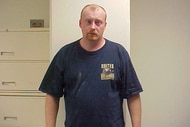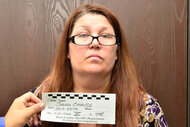Create a free profile to get unlimited access to exclusive videos, breaking news, sweepstakes, and more!
After Killing Her Husband With Poisoned Wine, Woman Manipulates Teen Into Burning Witness' House Down
Cherryle Dell was suspected of masterminding her estranged husband's death, but when tragedy struck twice, a small town was left reeling with a killer in their midst.
It started as a match made in heaven for one married couple and ended as anything but.
Scott and Cherryle Dell moved to the small farming town of Killaloe, Ontario, Canada, in the winter of 1988. Scott was a 36-year-old social worker described as kind and gentle, perhaps the opposite of his wife.
“There was an aura about him that really was quite beautiful,” Cherryle’s friend Gay Doherty told “Charmed To Death,” airing Sundays at 7/6c on Oxygen.
33-year-old Cherryle was more like a fish out of water in the farming community of Killaloe, wearing miniskirts and fishnets, always concerned with her appearance.
“She had this power over people that was unbelievably amazing,” said friend Elsa Steenberg.
Scott and Cherryle took in foster children as a means to supplement their income, adding to the couple’s shared three children. But it didn’t take long for Cherryle to grow tired of the same-old with Scott, and soon, she had an affair with her female friend, Gay Doherty.
Scott was desperate and wanted Cherryle back, even going so far as to allow Cherryle to continue with her affair with Doherty, as long as it kept the family together. But Cherryle wanted out.
Cherryle soon filed for divorce. But adding insult to injury, she made a shocking claim: Scott was molesting the children in the home.
The courts ordered Scott Dell to leave the Killaloe farm and hand the children over to Cherryle’s care. While it could have been damning for his reputation, their closest friends believed it was a manipulative tactic so that Cherryle could gain custody of the children.
Cherryle’s lover, Doherty, was even skeptical of her accusations. Soon, authorities doubted them as well and allowed Scott back into the matrimonial home. Cherryle moved out shortly after.
“I realized Scott was a very deep, caring man,” said Doherty. “And that I stepped into something I regret.”
Doherty eventually broke off their affair, leaving Cherryle alone in her growing resentment toward Scott.
In the summer of 1994, Scott was hit a hard blow when he was diagnosed with oral cancer that spread into his throat and lymph nodes. Upon the diagnosis, Cherryle halted the divorce proceedings. However, the couple remained separated. Then, to almost everyone’s delight and surprise, Scott won his battle against cancer.
In December 1995, Cherryle visited Scott at their home with a bottle of wine, alluding to a potential reconciliation. At the heels of learning he was in remission with his cancer, he was excited for his future, hopefully with Cherryle in it.
But on Dec. 29, a friend went to pick up Scott for some post-holiday shopping and immediately felt like something was amiss. The front door was open. The house was cold. And the sound of a needle on a spinning record carried no tune.
The friend found Scott dead in his own vomit on his children’s bedroom floor. A wine bottle and full glass were nearby.
Cherryle told police that Scott was suffering from cancer and expected to die soon. The coroner noted his death as cancer-related. Cherryle hurried the process to have Scott cremated, but Scott’s family grew suspicious. At the eleventh hour, an autopsy was performed owing to the family’s objections.
The medical examiner found that not only was Scott cancer-free, but his toxicity panel showed high levels of ethylene glycol, the substance commonly used as antifreeze. Tests showed that the wine bottle from the scene contained antifreeze. Soon, Cherryle changed her story and told police that Scott intended to die by suicide. Police concluded that Scott had ingested it to end his own life.
“Right away, when they were notified that Scott had died, his family suspected Cherryle of killing him,” Steenberg told producers.
But police said that Scott had cause for depression, not the least of which was Cherryle’s recent romance with 39-year-old Nancy Fillmore. The relationship had started a few months before Scott’s death. Fillmore gave her a place to stay and even gave Cherryle money toward the down payment of a home.
Fillmore also believed Cherryle’s claims about Scott’s abuse. However, it was Cherryle who allegedly began physically abusing Fillmore, leaving bruises on her arms.
Kim Meisel, a friend of Fillmore’s, recognized that she was struggling. Meisel invited Fillmore out for a boat ride to find out what was troubling her.
“She just started to cry and shake,” said Meisel. “And I said, ‘For God’s sake, Nancy, if you got something inside, just friggin’ say it.’”
“I could have stopped it,” said Fillmore, according to Meisel. “He’d still be alive if I would have stopped it!”
Meisel convinced Fillmore to go to the police, and in March 1997, two years after Scott’s death, Fillmore took her information to Ontario Provincial Police. She told them that Cherryle kicked Fillmore out of her own house and kept her belongings. More importantly, she said that Cherryle murdered Scott.
Fillmore told authorities that in December 1995, Cherryle brought a bottle of wine over to Scott. Cherryle then returned to Fillmore’s home and initiated a phone conversation with her estranged husband, keeping him on the line for nine hours. Cherryle, under the pretense of possible reconciliation, urged Scott to drink the wine while they listened to music and talked through the night.
Scott had lost his sense of taste after the cancer-related surgeries so that he couldn’t detect the poison.
Fillmore did admit to buying the wine at a liquor store and the antifreeze from Wal-Mart. She also watched Cherryle concoct the poisonous mixture in their kitchen. And Fillmore, fearing the repercussions of her confession to the police, became afraid for her life.
“Kim, I’m not going to make it to trial,” Fillmore told Meisel. “She’s going to take me out. I’m dead.”
Now the star witness in the investigation into Scott’s murder, Fillmore refused to move from her home until she got her possessions back from Cherryle. But in August 1997, a house fire tore through Fillmore’s home, and Fillmore didn’t make it out. An autopsy report revealed she died of smoke inhalation.
While Cherryle was under suspicion for the deaths of Scott and Fillmore, she had an alibi, and there was little evidence to show that she started the fire.
Police began canvassing the area and speaking to locals when they came across a name: Brent Crawford, a 16-year-old boy whom Cherryle also cast under her spell in the spring and summer of 1997.
The underage boy was sexually attracted to Cherryle and spent time in her home. He’d later brag to his friends that he had sexual intercourse with Cherryle.
“There was not one occasion, but multiple occasions where Brent was seen or witnessed to be harassing or in the vicinity of Nancy Fillmore’s home leading up to her death,” said Ontario Provincial Police investigator Ken Leppert. “There were a number of reasons for us to be concerned that Cherryle Dell and Brent Crawford had conspired to murder Nancy Fillmore.”
Crawford told his friends that Cherryle paid him to kill Fillmore, but it wasn’t enough to arrest him. Lacking physical evidence, police resorted to what’s called the "Mr. Big" police procedure, where an undercover officer acts as a crime boss to elicit a confession from a suspect interested in joining a fictitious criminal enterprise.
Crawford told the undercover officer that he broke into Fillmore’s house and struck her in the head. He then knocked over Fillmore’s lit candles and barricaded the door so that she couldn’t escape before climbing out a window. As payment, Cherryle gave him $300 and a motorcycle.
Police arrested Crawford, all while trying to find enough evidence to charge Cherryle for the two murders.
Through neighborhood canvassing, police learned that in the summer of 1995, Cherryle took her dog to a local veterinarian and inquired about the effects of antifreeze poisoning. That fall, Cherryle also called poison control and looked for additional information about the effects of antifreeze on a human being.
In December 1997, police arrested Cherryle for the murder of Scott Dell.
Cherryle stood trial for her husband’s murder in November 2000. The defense presented a theory that Cherryle tried talking Scott out of suicide. The scenario was hard to disprove between the murder of the star witness and a case built on circumstantial evidence. But then a cellmate of Cherryle’s came forward and testified that Cherryle admitted to her, in detail, how she killed her husband.
It was enough to convict Cherryle Dell of first-degree murder. She was sentenced to 25-to-life without parole.
Following the verdict, Crawford stood trial for Nancy Fillmore’s murder. He, too, was convicted of first-degree murder and sentenced to 10 years in prison, as he was still considered a minor.
For Nancy’s death, Cherryle was found guilty of first-degree murder and intimidation of a witness. As Canadian law prohibited convicts from serving two life sentences, she was sentenced to five years.
“It just makes me sick,” said Meisel. “Those two deaths could have been stopped or prevented, and how this woman has so much control over people boggles my mind.”
Cherryle Dell remains in prison to this day.
For more on this case and others like it, watch “Charmed To Death,” airing Sundays at 7/6c on Oxygen.

































